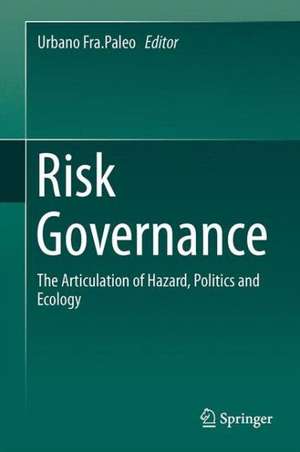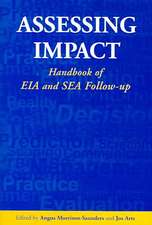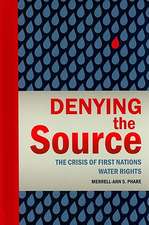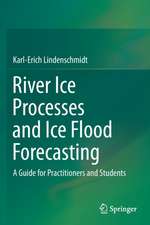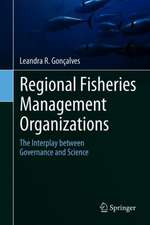Risk Governance: The Articulation of Hazard, Politics and Ecology
Editat de Urbano Fra.Paleoen Limba Engleză Hardback – 4 noi 2014
The first section explores risk governance under conditions of increasing complexity, diversity and change. The discussion includes chapters on The problem of governance in the risk society; Making sense of decentralization; Understanding and conceptualizing risk in large-scale social-ecological systems; The disaster epidemic and Structure, process, and agency in the evaluation of risk governance. Part II, focused on governance in regions and domains of risk, includes nine chapters with discussion of Climate governance and climate change and society; Climate change and the politics of uncertainty; Risk complexity and governance in mountain environments; On the edge: Coastal governance and risk and Governance of megacity disaster risks, among other important topics. Part III discusses directions for further advancement in risk governance, with ten chapters on such topics as the transition From risk society to security society; Governing risk tolerability; Risk and adaptive planning for coastal cities; Profiling risk governance in natural hazards contexts; Confronting the risk of large disasters in nature and Transitions into and out of a crisis mode of socio-ecological systems.
The book presents a comprehensive examination of the complexity of both risk and environmental policy-making and of their multiple—and not always visible—interactions in the context of social–ecological systems. Just as important, it also addresses unseen and neglected complementarities between regulatory policy-making and ordinary individual decision-making through the actions of nongovernmental actors. A range of distinguished scholars from a diverse set ofdisciplines have contributed to the book with their expertise in many areas, including disaster studies, emergency planning and management, ecology, sustainability, environmental planning and management, climate change, geography, spatial planning, development studies, economy, political sciences, public administration, communication, as well as physics and geology.
| Toate formatele și edițiile | Preț | Express |
|---|---|---|
| Paperback (1) | 956.03 lei 6-8 săpt. | |
| SPRINGER NETHERLANDS – 23 aug 2016 | 956.03 lei 6-8 săpt. | |
| Hardback (1) | 962.18 lei 6-8 săpt. | |
| SPRINGER NETHERLANDS – 4 noi 2014 | 962.18 lei 6-8 săpt. |
Preț: 962.18 lei
Preț vechi: 1173.39 lei
-18% Nou
Puncte Express: 1443
Preț estimativ în valută:
184.13€ • 199.94$ • 154.67£
184.13€ • 199.94$ • 154.67£
Carte tipărită la comandă
Livrare economică 22 aprilie-06 mai
Preluare comenzi: 021 569.72.76
Specificații
ISBN-13: 9789401793278
ISBN-10: 9401793271
Pagini: 400
Ilustrații: XXIII, 515 p. 39 illus., 3 illus. in color.
Dimensiuni: 155 x 235 x 27 mm
Greutate: 0.93 kg
Ediția:2015
Editura: SPRINGER NETHERLANDS
Colecția Springer
Locul publicării:Dordrecht, Netherlands
ISBN-10: 9401793271
Pagini: 400
Ilustrații: XXIII, 515 p. 39 illus., 3 illus. in color.
Dimensiuni: 155 x 235 x 27 mm
Greutate: 0.93 kg
Ediția:2015
Editura: SPRINGER NETHERLANDS
Colecția Springer
Locul publicării:Dordrecht, Netherlands
Public țintă
ResearchCuprins
Chapter 1: Introduction.- Part I. Risk governance under conditions of increasing complexity, diversity and change.- Chapter 2: Risk governance and resilience: New approaches to cope with uncertainty and ambiguity.- Chapter 3: The problem of governance in the risk society: Envisaging strategies, managing not-knowing Chapter 4: Making sense of decentralization: Coping with the complexities of the urban environment.- Chapter 5: Local governance and soft infrastructure for sustainability and resilience.- Chapter 6: Understanding and conceptualizing risk in large-scale social-ecological systems.- Chapter 7: Interest, interest, whose interest is at risk? Risk governance, issues management, and the fully functioning society.- Chapter 8: The emergence of civil society: Networks in disasters, mitigation, and recovery.- Chapter 9: Risk governance and the integration of different types of knowledge.- Chapter 10: Educational governance in disaster risk reduction Chapter 11: The disaster epidemic.- Chapter 12: An evaluation of risk management and emergency management. Relying on the concept of comprehensive vulnerability management for an integrated perspective.- Chapter 13: Leadership and collaborative governance in managing emergencies and crises.- Chapter 14: Structure, process, and agency in the evaluation of risk governance.- Part II. Governance in regions and domains of risk.- Chapter 15: Climate governance and climate change and society.- Chapter 16: Climate change and the politics of uncertainty: Lessons from Iraq.- Chapter 17: Water risk management, governance, IWRM and implementation.- Chapter 18: The emergence of landscape governance in society-environment relationships.- Chapter 19: Risk complexity and governance in mountain environments.- Chapter 20: On the edge: Coastal governance and risk Chapter 21: Ocean governance and risk management.- Chapter 22: Governance of megacity disaster risks: Confronting the contradictions.- Chapter 23: Natech disaster risk reduction: Can integrated risk governance help?.- Part III. Directions for further advancement in risk governance.- Chapter 24: From risk society to security society.- Chapter 25: Governing risk tolerability.- Chapter 26: Risk and adaptive planning for coastal cities.- Chapter 27: Risk governance and development.- Chapter 28: Profiling risk governance in natural hazards contexts.- Chapter 29: Risk governance and the social amplification of risk: A commentary.- Chapter 30: Help or hindrance? The contribution of the resilience approach to risk governance.- Chapter 31: Risk mitigation: We are all going to die.- Chapter 32: Confronting the risk of large disasters in nature.- Chapter 33: Transitions into and out of a crisis mode of socio-ecological systems.- About the editor.- Index.
Textul de pe ultima copertă
This book explores the common language of politics, ecology and risk, and crosses their conceptual divides. It seeks to shed light on the underlying structural factors, processes, players and interactions in the risk scenario, all of which influence decision-making that both increases and reduces disaster risk.
The first section explores risk governance under conditions of increasing complexity, diversity and change. The discussion includes chapters on The problem of governance in the risk society; Making sense of decentralization; Understanding and conceptualizing risk in large-scale social-ecological systems; The disaster epidemic and Structure, process, and agency in the evaluation of risk governance. Part II, focused on governance in regions and domains of risk, includes nine chapters with discussion of Climate governance and climate change and society; Climate change and the politics of uncertainty; Risk complexity and governance in mountain environments; On the edge: Coastal governance and risk and Governance of megacity disaster risks, among other important topics. Part III discusses directions for further advancement in risk governance, with ten chapters on such topics as the transition From risk society to security society; Governing risk tolerability; Risk and adaptive planning for coastal cities; Profiling risk governance in natural hazards contexts; Confronting the risk of large disasters in nature and Transitions into and out of a crisis mode of socio-ecological systems.
The book presents a comprehensive examination of the complexity of both risk and environmental policy-making and of their multiple—and not always visible—interactions in the context of social–ecological systems. Just as important, it also addresses unseen and neglected complementarities between regulatory policy-making and ordinary individual decision-making through the actions of nongovernmental actors. A range of distinguished scholars from a diverse set ofdisciplines have contributed to the book with their expertise in many areas, including disaster studies, emergency planning and management, ecology, sustainability, environmental planning and management, climate change, geography, spatial planning, development studies, economy, political sciences, public administration, communication, as well as physics and geology.
The first section explores risk governance under conditions of increasing complexity, diversity and change. The discussion includes chapters on The problem of governance in the risk society; Making sense of decentralization; Understanding and conceptualizing risk in large-scale social-ecological systems; The disaster epidemic and Structure, process, and agency in the evaluation of risk governance. Part II, focused on governance in regions and domains of risk, includes nine chapters with discussion of Climate governance and climate change and society; Climate change and the politics of uncertainty; Risk complexity and governance in mountain environments; On the edge: Coastal governance and risk and Governance of megacity disaster risks, among other important topics. Part III discusses directions for further advancement in risk governance, with ten chapters on such topics as the transition From risk society to security society; Governing risk tolerability; Risk and adaptive planning for coastal cities; Profiling risk governance in natural hazards contexts; Confronting the risk of large disasters in nature and Transitions into and out of a crisis mode of socio-ecological systems.
The book presents a comprehensive examination of the complexity of both risk and environmental policy-making and of their multiple—and not always visible—interactions in the context of social–ecological systems. Just as important, it also addresses unseen and neglected complementarities between regulatory policy-making and ordinary individual decision-making through the actions of nongovernmental actors. A range of distinguished scholars from a diverse set ofdisciplines have contributed to the book with their expertise in many areas, including disaster studies, emergency planning and management, ecology, sustainability, environmental planning and management, climate change, geography, spatial planning, development studies, economy, political sciences, public administration, communication, as well as physics and geology.
Caracteristici
Offers a comprehensive, interdisciplinary approach to risk governance Examines the prospects of risk governance in specific environments including cities, oceans, and coastal areas Presents the expert views of a range of distinguished scholars in risk, ecology, and political science
